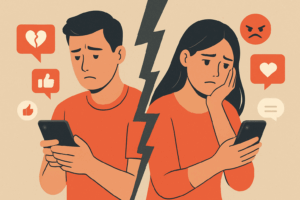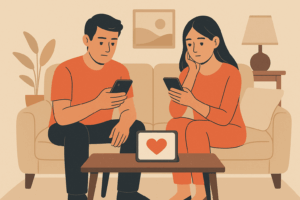In today’s digital age, social media is an inseparable part of our daily lives. From morning scrolls to late-night reels, we’re constantly plugged in—sharing, liking, commenting, and consuming content. While platforms like Instagram, Facebook, and WhatsApp help us stay connected with the world, they also have a profound impact on the most intimate part of our lives: our marriages.
Whether you’re newly married, in a long-term relationship, or contemplating tying the knot, understanding how social media influences marriages is essential in building a healthy, lasting bond.
🔻 The Negative Effects of Social Media on Marriage
1. Jealousy and Insecurity
One of the biggest downsides of social media is its ability to fuel insecurity. When a partner sees their spouse liking or commenting on someone else’s photo—especially of the opposite sex—it can lead to jealousy and assumptions.
Additionally, constant exposure to the “perfect couple” photos or honeymoon pictures of others can create unrealistic expectations. What you see online is often a highlight reel—not the full reality. This comparison trap can leave couples feeling inadequate or unsatisfied with their own relationship.
“Why don’t we go on trips like them?”
“Why doesn’t my spouse post about me?”
These thoughts can erode trust and self-worth over time.
2. Privacy Invasion and Oversharing
Social media encourages people to share every aspect of their lives—including their relationships. While a birthday post or anniversary shoutout is harmless, some couples go a step further by broadcasting personal arguments, emotional breakdowns, or private decisions online.
Oversharing invites external opinions, judgments, and interference. In some cases, it can also pressure the partner to match online expectations, leading to frustration or resentment.
Moreover, snooping into a partner’s chats, comments, or followers can break the trust in a relationship. Healthy marriages are built on trust and communication, not digital surveillance.

3. Digital Disconnection
Ironically, while social media is designed to connect people, it often causes emotional disconnection between couples. Many married individuals report spending more time on their phones than with their spouses.
Quality time is crucial in nurturing emotional intimacy. If evenings are spent scrolling through feeds instead of having meaningful conversations, relationships may start to feel hollow or neglected.
Even the bedroom—once a sacred space for intimacy—has become a place where phones light up more often than faces.
4. Emotional Affairs and Infidelity
One of the most alarming ways social media affects marriages is by enabling emotional or physical infidelity. The ease of reconnecting with ex-partners, secret messaging, and flirting online can tempt individuals into crossing boundaries.
While some may argue that texting an old friend is harmless, emotional cheating—when someone forms a deep connection outside the marriage—is just as damaging as physical affairs. Apps like Instagram, Snapchat, or Facebook make it dangerously easy to engage in such interactions discreetly.
🔺 The Positive Side: Social Media Can Strengthen Marriages Too
Despite its pitfalls, social media isn’t all bad. In fact, when used mindfully, it can play a supportive role in a healthy marriage.
1. Staying Connected Over Long Distances
For couples in long-distance marriages—such as defence personnel, traveling professionals, or NRIs—social media helps bridge the gap. Sharing a meme, sending a voice note, or having a quick video call can help partners stay emotionally close despite physical distance.
It creates a sense of involvement in each other’s daily life, even from miles away.
2. Public Affirmation and Appreciation
Posting about your partner or celebrating your anniversary online may seem superficial to some, but public displays of appreciation can actually reinforce emotional bonds. It sends a message to your partner—and the world—that you value your relationship.
These small gestures can boost morale and make your spouse feel loved, seen, and celebrated.
3. Access to Relationship Resources
Social media is home to thousands of pages, podcasts, and videos focused on relationship advice, marriage counseling, and emotional well-being. From quick communication tips to deep-dive discussions on conflict resolution, these resources can be a lifeline for struggling couples.
They help normalize issues, provide expert insights, and encourage couples to grow together instead of giving up too soon.
4. Online Communities and Support Groups
Couples going through similar challenges—be it infertility, long-distance, or adjusting to in-laws—can find support and empathy in online communities. Platforms like Facebook Groups or Instagram pages dedicated to couples’ wellness allow people to share their stories and learn from others.
Knowing you’re not alone in your struggles can bring immense comfort and hope.
🛠️ So, What’s the Solution? Balance.
The impact of social media on marriages ultimately comes down to how you use it. Here are a few practical ways to maintain balance:
-
Set boundaries: No phones during meals or bedtime.
-
Be transparent: Avoid secrecy in your online behavior.
-
Celebrate your partner: A little appreciation post can go a long way.
-
Communicate offline: Don’t rely on DMs to resolve conflicts.
-
Don’t compare: Every couple’s journey is unique. Avoid comparisons.
❤️ Final Thoughts
Social media is not the enemy of marriage—misuse is. In the right doses, it can be a tool for connection, appreciation, and growth. But if left unchecked, it can slowly chip away at the foundation of your relationship.
As with everything in marriage, the key lies in mutual respect, healthy boundaries, and open communication. Use social media to enhance your connection—not replace it.

